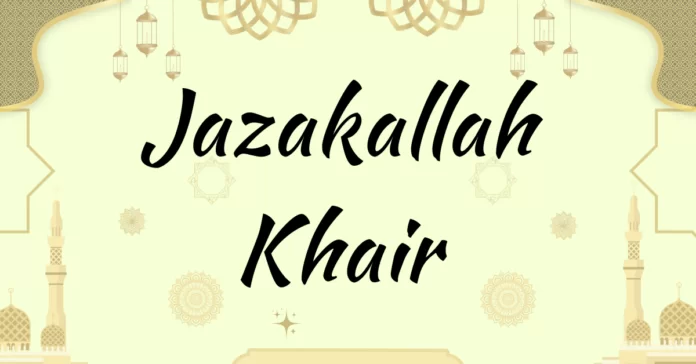Introduction
In the vast tapestry of Islamic culture, few expressions carry as much weight as “Jazakallah Khair.” Rooted in Arabic, this phrase encapsulates a profound sense of gratitude, invoking blessings from Allah. Beyond mere thanks, it embodies a spiritual connection, fostering a culture of appreciation and reciprocity. Let’s delve deeper into the meaning, significance, and usage of this sacred phrase.
What Does Jazakallah Khair Mean?
Jazakallah in Arabic:
جزاك اللهُ
Jazakallahu Khairan in Arabic:
جزاك اللهُ خيرً
At its core, “Jazakallah Khair” translates to “May Allah reward you with goodness.” It transcends the mundane realm of everyday politeness, invoking divine blessings upon the recipient. Unlike a simple “thank you,” it acknowledges the inherent goodness in the action and beseeches Allah to shower His blessings upon the benefactor.
Understand it’s meaning.
The Importance of Saying it
In the rich tapestry of Islamic teachings, gratitude holds a special place. The Prophet Muhammad (peace be upon him) emphasized the importance of expressing appreciation for acts of kindness. Saying it not only acknowledges the favor bestowed upon us but also uplifts the spirits of the one who has done good.
Understanding the Hadiths
The wisdom of saying it finds resonance in the Hadith literature. Narrations attributed to the Prophet Muhammad (peace be upon him) highlight the significance of expressing gratitude. One Hadith narrates that praising the benefactor satisfactorily is an act of goodness in itself.
Narrated by Usamah bin Zaid (May Allah be pleased with them)
The Messenger of Allah (ﷺ) said, “He who is favored by another and says to his benefactor: ‘Jazak-Allah khairan (may Allah reward you well)’ indeed praised (the benefactor) satisfactorily.”
[Reference: Riyad As-Salihin – [At-Tirmidhi], Book 17, Hadith 1496]
This Hadith underscores the importance of expressing gratitude with the phrase “Jazakallah Khair” and highlights its significance in Islamic teachings.
The Proper Response: Wa Iyyaka
Just as important as expressing gratitude is acknowledging it graciously. When someone says “Jazakallah Khair,” the appropriate response is “Wa Iyyaka,” meaning “And to you too.” This reciprocal exchange fosters a culture of mutual appreciation and reinforces the bond of brotherhood/sisterhood among Muslims.
Using Jazakallah Khair in Everyday Conversations
From social media platforms to face-to-face interactions, Muslims use “Jazakallah Khair” in a variety of contexts. Whether expressing appreciation for a kind gesture, seeking blessings for others, or acknowledging support, this phrase transcends linguistic barriers to convey heartfelt gratitude.
The Spiritual Dimension
Beyond its linguistic and cultural significance, “Jazakallah Khair” carries a profound spiritual dimension. It reminds us of our dependence on Allah’s mercy and blessings. By invoking His name, we acknowledge His role as the ultimate bestower of goodness.
In Family and Community
Within the family unit and broader community, expressing gratitude becomes even more paramount. Saying “Jazakallah Khair” to parents, spouses, friends, and community members strengthens bonds and fosters a culture of kindness and appreciation.
Conclusion
In a world often characterized by haste and indifference, expressions of gratitude like “Jazakallah Khair” serve as beacons of light. They remind us of the importance of acknowledging the goodness in others and seeking blessings from the Divine. As we navigate life’s journey, may we never forget the power of a simple “Jazakallah Khair” to uplift spirits and nurture the soul.

